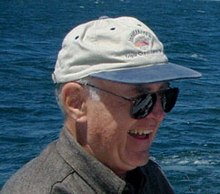Utente:LiukSkin/SandBox

Gordon Moore (San Francisco, 3 gennaio 1929) è un imprenditore e informatico statunitense, cofondatore della Fairchild Semiconductor nel 1957 e poi della Intel Corporation nel 1968, di cui è tutt'ora presidente emerito.
È anche l'autore della Legge di Moore (pubblicata il 19 aprile 1695 in Electronics Magazine).
Vita e Carriera modifica
Nato a San Francisco, in California, crebbe nella cittadina di Pescadero, dove viveva la sua famiglia. Si laureò chimica presso l'Università della California, Berkeley nel 1950 ed in seguito ottenne dal California Institute of Technology (CalTech) il Dottorato di Ricerca ed una laurea breve in fisica nel 1954. Prima dei suoi studi a Berkeley, frequento i primi due anni di università presso la San José State University, dove conobbe Betty, la sua futura moglie. Moore completò il suo lavoro da post-doc presso il Johns Hopkins University Applied Physics Laboratory, prima del 1956.[1]
Insieme ad un altro ex alunno della CalTech, William Shockley, entrò nella divisione Shockely Semiconductor Laboratory della Beckman Instruments.
He joined Caltech alumnus William Shockley at the Shockley Semiconductor Laboratory division of Beckman Instruments, but left with the "Traitorous Eight", when Sherman Fairchild agreed to back them and created the influential Fairchild Semiconductor corporation.
Moore co-founded Intel Corporation in July 1968, with Bob Noyce, serving as Executive Vice President until 1975 when he became President. In April 1979, Dr. Moore became Chairman of the Board and Chief Executive Officer, holding that position until April 1987, when he became Chairman of the Board. He was named Chairman Emeritus of Intel Corporation in 1997.
Moore has joined Gilead Sciences’ Board of Directors since 1996, after serving as a member of the company’s Business Advisory Board from 1991 until 1996.[2] It has also been reported that Moore is a former Chairman and present Life Trustee of the California Institute of Technology, a member of the National Academy of Engineering and a Fellow of the Royal Society of Engineering (UK). He is the recipient of the National Medal of Technology and the Presidential Medal of Freedom, the United States’ highest civilian honor. In 1998 he was inducted as a Fellow of the Computer History Museum.
In 2001, Moore and his wife donated $600 million to Caltech, the largest gift ever to an institution of higher education. He said that he wants the gift to be used to keep Caltech at the forefront of research and technology. Moore was chairman of Caltech's board of trustees from 1994 to 2000, and continues as a trustee today. In 2002, he received the Bower Award for Business Leadership. In 2003, he was elected a Fellow of the American Association for the Advancement of Science.
The library at the Centre for Mathematical Sciences at the University of Cambridge is named after him and his wife Betty, as is the Moore Laboratories building (dedicated 1996) at Caltech.
With his wife he endowed the Gordon and Betty Moore Foundation.
On December 6, 2007, Gordon Moore and his wife donated $200 million to Caltech and the University of California for the construction of the Thirty Meter Telescope, the world's largest optical telescope. The telescope will have a mirror 30 meters across. This is nearly three times the size of the current record holder, Large Binocular Telescope.[3]
Moore was awarded the 2008 IEEE Medal of Honor for "pioneering technical roles in integrated-circuit processing, and leadership in the development of MOS memory, the microprocessor computer and the semiconductor industry."[4] Moore was featured in the documentary film Something Ventured which premiered in 2011.
Moore enjoys many different recreational activities, including car painting and making model airplanes. He has said his conservation efforts are partly inspired by his interest in fishing.[5]
In 2011, Moore's genome was the first human genome sequenced on Ion Torrent's Personal Genome Machine platform, a massively parallel sequencing device. Ion Torrent's device obtains sequence information by directly sensing ions produced by DNA polymerase synthesis using ion-sensitive field effect transistor sensors. [6]
See also modifica
Riferimenti modifica
- ^ [1][collegamento interrotto]
- ^ Gilead – Investor Relations – Biography, su investors.gilead.com. URL consultato il July 11, 2011.
- ^ Thirty Meter Telescope Moves Forward, Sky & Telescope, August 2007
- ^ IEEE Medal of Honor Recipients
- ^ Charlie Rose, November 14, 2005
- ^ Rothberg et al., Nature, 2011.
Link esterni modifica
- Wikiquote contiene citazioni di o su LiukSkin/SandBox
- The Fairchild Chronicles
- Gordon E. Moore Association by the Horatio Alger Foundation
- Betty and Gordon Moore Library
- Biography at Intel website
- Forbes.com: Forbes World's Richest People
- Moore says nanoelectronics face tough challenges – By Michael Kanellos, CNET News.com, March 9, 2005
- [2] A Wired News article
- Interview with Caltech News
- Dedication of Moore Labs at Caltech
- The Accidental Entrepreneur, (Gordon E. Moore): From Caltech to Intel